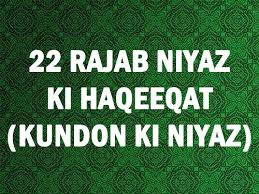Is Kundon ki Niyaz Permitted in Islam?
It is definitely permissible to do this Fateha of Imam Jafar Sadiq Rahmatulahi Alai in the holy month of Rajab.
Faqih e Azam e Hind, Khalifa e Alahazrat , Hazrat Sadr us Sharia RA wrote :
"MAH E RAJAB ME HAZRAT IMAM JAFAR SADIQ RA KO EESAL E SAWAB KELIE POORIO KE KOONDE BHARE JAATE HAIN OR FATEHA DILA KAR KHILATE HAIN , YE JAAIZ HAI " (Bahar e Shariat)
Is it celebrated on 22nd Rajab or 15th Rajab?
Even though the Wisaal of Sayyiduna Imam Ja’far Saadiq Radi Allahu Ta'ala Anhu is on the 15th of Rajab, on the 22nd of Rajab Sunnis do a Niyaz (Faateha) attributed to Imam Ja’far Saadiq Radi Allahu Ta'ala Anhu. It must be noted that there is no objection to making this Niyaz or any other Niyaz of the Beloveds.
However, our Masha’ikh have mentioned that 22nd of Rajab also marks the Wisaal of Sahabi e Rasool Hazrat Sayyiduna Amir Mu’awiyah Radi Allahu Ta'ala Anhu and some have said that shias show happiness on this day, at his Wisaal.
Our Masters have mentioned that when doing the Niyaz of Sayyiduna Imam Ja’far Saadiq Radi Allahu Ta'ala Anhu on this day, we should also include with it the Faateha of Hazrat Sayyiduna Amir Mu’awiyah Radi Allahu Ta'ala Anhu, as some have mentioned that Sayyiduna Imam Ja’far Saadiq Radi Allahu Ta'ala Anhu initially recommended this Faateha to honour Hazrat Amir Mu’awiyah Radi Allahu Ta'ala Anhu.
How is Niyaz of Imam Ja’far Saadiq celebrated?
Concerning the Niyaz of Imam Ja’far Saadiq Radi Allahu Ta'ala Anhu Huzoor Sayyidi Sadrush Shariah says,
In the month of Rajab, the Koonde of Hazrat Jalaal Bukhari Rahmatullah Allai is done by some people. This is done by cooking rice or Kheer which is filled into earthen troughs (i.e. clay bowls). After that, Faateha is made (over it), and it is fed to the people. This too is permissible. However, there is one thing that is undesirable, and that is the fact that they only feed it to people at the place where the bowls have been filled. They do not allow one to move away from there.
This is an absurd practice (i.e. the practice of saying it can only be eaten there) and is the manner of ignorant people. This does not prevail amongst those who are educated.
Similarly, during the month of Rajab, earthen troughs are filled with Purees for the Esaal-e-Thawaab of Imam Ja’far Saadiq Radi Allahu Ta'ala Anhu (i.e. famously known as Kheer Puri). This too is permissible. However, even in this, some people have brought in the same restriction. This is an unfounded restriction. With regards to this ‘Koonde’ (i.e. Niyaz of Imam Ja’far), there is also a book which is known as ‘Dastaan-e-Ajeeb. Some people read this during this time. There is no source of that which has been written in this book. It is advisable to refrain from reading it. One should simply read the Faateha and perform the Esaal-e-Thawaab. [Bahaar e Shariat Volume 16]
Hence, to do this Niyaz on the 22nd of Rajab or any other day is entirely permissible. The same applies to any other Niyaz. It may be done on any day, as long as the intention is pure and it is done within the confines of the pristine Shariah.
It must further be noted that anyone who slanders any Sahabi of Nabi is destined for hell. Aala Hazrat Imam Ahle Sunnat Radi Allahu Ta'ala Anhu says that the one who slanders Hazrat Amir Mu’awiyah Radi Allahu Ta'ala Anhu is a dog from among the dogs of Hell.
Once, Hazrat Sayyiduna Abdullah ibn Mubaarak Radi Allahu Ta'ala Anhu was asked about whether Hazrat Amir Mu’awiyah Radi Allahu Ta'ala Anhu or Hazrat Umar bin Abdul Aziz Radi Allahu Ta'ala Anhu is greater.
He was clearly displeased by this question and clarified that a non-Sahabi cannot be more exalted than a Sahabi, but he responded to this question with these beautiful words;
“The dust which entered the nostrils of the horse of Hazrat Amir Mu’awiyah Radi Allahu Ta'ala Anhu while he rode in battle beside Nabi sallal laahu alaihi wasallam is more virtuous than Hazrat Umar bin Abdul Aziz Radi Allahu Ta'ala Anhu. ”
Source:
Name of Book: Sayyiduna Imam Ja’far Saadiq
Compiler: Muhammad Afthab Cassim Qaadiri Razvi NooriPROOFS FROM HOLY QUR’AN
Verse 1
And those who came after them say, “O our Lord! Forgive us, and our brothers who accepted faith before us, and do not keep any malice in our hearts towards the believers – O our Lord! Indeed You only are the Most Compassionate, Most Merciful.”. (Surah Hashr 59:10)
Note that the above verse is a very strong evidence of the practice of the Sahaba, which was so loved by Allah that it is part of the Holy Qur’an. Why would the Sahaba pray for the deceased people if their prayer was of no benefit? And to top it all, Allah the Almighty has approved and praised their action!
Verse 2
"O our Lord! And forgive me, and my parents, and all the Muslims on the day when the account will be established." (Surah Ibrahim 14:41)
The benefit of the above verse is obvious. The prayer of Prophet Syedna Ibrahim (peace be upon him), includes all believers – right from the beginning i.e. those before him, and till the end of this world i.e. even those who are not yet born. Al Hamdo Lillah! And this prayer is often made in the last part (Qaadah) of our Salaat.
Verse 3
And those who believe and whose families follow them in Faith, -- to them We shall join their families: nor shall We deprive them of the fruit of anything of their works: yet each individual is in pledge for his deeds. (Surah Toor 52:21).”
This verse says that children will be admitted into Paradise because of the righteousness of the parents.
Verse 4
And lower your wing humbly for them, with mercy, and pray, "My Lord! Have mercy on them both, the way they nursed me when I was young." (Surah Bani Israel 17:24)
This verse is in fact a command from Allah for all believers to seek mercy for their parents. So what is your opinion? Will not the command of Allah hold any benefit for the deceased parent?? It certainly does.
Also note that there are several other verses from the Holy Qur’an that teach us to pray, and the prayer includes all Muslim brothers & sisters (living, passed away or yet to be borne).
Readers are requested to reflect on the fact that the above verses are part of the Holy Qur’an – they are read perhaps millions of times every day all over the world, as part of regular recitation, and also as Qirat within Salaat, and also as prayer in the last part (Qaadah) of Salaat.
PROOFS FROM THE HADEETH
GENERAL PERMISSIONS (HADEETH # 1 - 4)
Hadeeth 1Abu Huraira (Allah be well pleased with him) reported Allah's Messenger (peace and blessings be upon him) as saying: When a man dies, his acts come to an end, but three, recurring charity, or knowledge (by which people) benefit, or a pious son, who prays for him (for the deceased). (Muslim)
Hadeeth 2
The Holy Prophet (peace and blessings be upon him)said, "What is credited to a believer of his action and good deed after his death is any useful knowledge he might have taught or spread, a Allah-fearing child he might have left behind, a copy of the Qur'an he might have left to an heir, a mosque he might have built, a house he might have dedicated for use by travelers, a stream or river he might have caused to run, a donation to charity (i.e. sadaqah) he might have set aside when he was enjoying good health. All that catches up with him after his death." (Ibn Majah)
Hadeeth 3
Narrated Abdullah ibn Amr ibn al-'Aas (Allah be well pleased with him): Al-'As ibn Wa'il left his will that a hundred slaves should be emancipated on his behalf. His son Hisham emancipated fifty slaves and his son Amr intended to emancipate the remaining fifty on his behalf, but he said: I should ask first the Apostle of Allah . He, therefore, came to the Holy Prophet and said: Apostle of Allah, my father left in his will that a hundred slaves should be emancipated on his behalf and Hisham has emancipated fifty on his behalf and fifty remain. Shall I emancipate them on his behalf? The Apostle of Allah said: Had he been a Muslim and you had emancipated slaves on his behalf, or given sadaqah on his behalf, or performed the pilgrimage, that would have reached him. (Abu Daud)
Hadeeth 4
Abu Huraira (Allah be well pleased with him) reported Allah's Messenger (peace and blessings be upon him) as saying: He who alleviates the suffering of a brother out of the sufferings of the world, Allah would alleviate his suffering from the sufferings of the Day of Resurrection, and he who finds relief for one who is hard pressed, Allah would make things easy for him in the Hereafter, and he who conceals (the faults) of a Muslim, Allah would conceal his faults in the world and in the Hereafter. Allah is at the back of a servant so long as the servant is at the back of his brother, and he who treads the path in search of know- ledge, Allah would make that path easy, leading to Paradise for him and those persons who assemble in the house among the houses of Allah (mosques) and recite the Book of Allah and they learn and teach the Qur'an (among themselves) there would descend upon them the tranquility and mercy would cover them and the angels would surround them and Allah makes a mention of them in the presence of those near Him, and he who is slow-paced in doing good deeds, his (high) lineage does not make him go ahead. (Muslim)












No comments